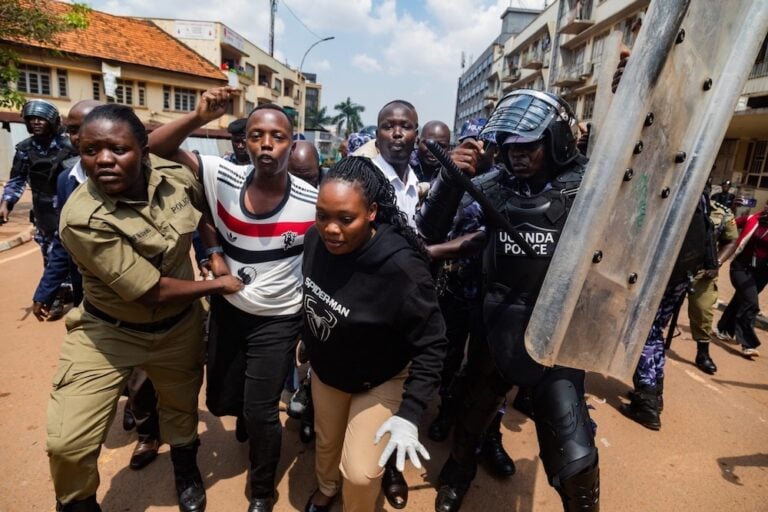The Broadcasting Council blocked privately-owned radio stations from live broadcasting a conference organised to discuss social, cultural, economic and developmental issues.
(HRNJ-Uganda/IFEX) – The Broadcasting Council (BC) of Uganda has blocked privately-owned radio stations from live broadcasting a conference organised by the Buganda Kingdom.
The Ttabamiruka is an annual conference organised by the Buganda Kingdom to review and discuss the social, cultural, economic and developmental issues of the kingdom. The theme for the 2010 conference was Poverty and Development.
The conference, held on 17 December 2010 at the Wampewo Avenue-based Hotel Africana, in a suburb of Kampala, was supposed to be broadcast live by several radio stations, including the Buganda Kingdom-owned Central Broadcasting Services (CBS FM) radio station, but all were stopped by the BC.
By the time the directive was issued by the BC, CBS FM was already relaying the debates live.
A CBS FM staffer who preferred to remain anonymous said the station received a call from the BC telling them to suspend the live broadcast, equating it to the open-air talk shows locally known as Ebimeeza, which were banned in September 2009.
“We only broadcast live the speech of the king, His Majesty Ronald Muwenda Mutebi II,” a staffer said. The station was accused of failing to consult the BC on the issues to be discussed and aired during the conference.
The Kingdom of Buganda comprises one of the largest ethnic groups in Uganda and is based in the central region. Most of its people are languishing in poverty. National Bureau of Statistics figures indicate that more than 38% of the total population in Uganda lives below poverty line.
The chairman of the BC, Eng. Godfrey Mutabazi, told the Human Rights Network for Journalists-Uganda (HRNJ-Uganda) that the conference broadcasts were not much different from the banned Ebimeeza, which were broadcast from bars and night clubs.
“We were not informed as a regulatory body about the topics to be discussed and the guests. So what they were doing was illegal because we banned the Ebimeeza in 2009. We were even taken to court over our action,” Mutabazi said. He explained that there is a license requirement stipulating that all radio stations planning to produce live broadcast programmes should own pre-listening gadgets, but most radio stations have failed to comply with the requirement. “We can tolerate live soccer matches or Independence commemorations but not debates,” Mutabazi stressed.
In September 2009, the council arbitrarily closed down five privately-owned radio stations, 88.8 and 89.2 CBS FM, Ssuubi FM, Radio Sapientia and Radio Two (Akkaboozi), and banned open-air radio talk shows.
HRNJ-Uganda feels that the BC is overstepping its powers when it begins to regulate people’s thoughts and information. These actions are illegal as they limit the ability of citizens to exercise their fundamental freedoms and liberties as stipulated in Art. 29 of the constitution of the Republic of Uganda
Art. 29(a) states, “Every person shall have the right to freedom of speech and expression which shall include freedom of the press and the media.”
“Ugandans must be free to discuss any issues that touch their lives and their views must be heard by those in authority as a way of holding them accountable, especially during this campaign period. Radio is a primary source of information for Ugandans and must be allowed to operate independently without interference from the government,” said HRNJ-Uganda Board Chairman Robert Ssempala
In light of this, HRNJ-Uganda calls on the judiciary to speed up the hearing of a case challenging the BC’s power over people’s right to freedom of expression, which was filed early in 2010.


